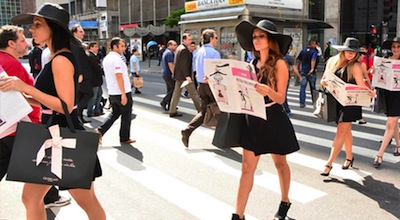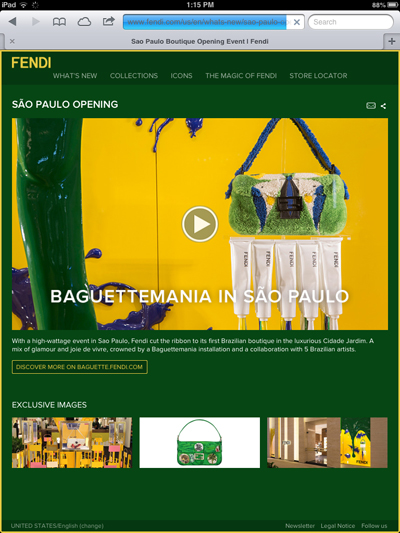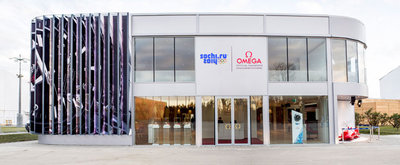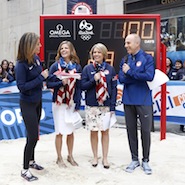With the Olympics just a month-and-a-half away, Rio de Janeiro state governor Francisco Dornelles declared a state of emergency to procure sufficient funding.
The financial emergency was swiftly answered by the central government, which disbursed $900 million to shore up security and to complete an upgrade to the city’s transport system. Brazil’s precipitous recession is one of several issues to exert trouble on the Olympics, making both the event and the once-promising country a dicey proposition for brands.
Um mundo novo
The city of Rio de Janeiro rather than the state is primarily responsible for producing the Olympic Games, but the state is responsible for some expenses, including the metro line that will connect a cluster of venues to the rest of the city.
Despite the declared emergency, Eduardo Paes, the city’s mayor, said that the money shortage would not impact the Games themselves. Instead, it would impact services, including public health, security and transportation.

Image courtesy of Guerlain
Rio is expecting half a million attendees for the Aug. 5-21 Olympics and Sep. 7-18 Paralympics. Security is a top concern for every Olympics, as terrorists have long targeted the Games, but Rio’s enormous crime rate elevates the concern on a local level.
Likewise, the fear surrounding the mosquito-transmitted Zika Virus, which has now been more conclusively linked to microcephaly in newborns and can make pregnancy a risk for as many as two years, augment the need for sufficient health measures.
Governor Dornelles is blaming the financial shortcoming on plummeting oil prices. Rio is the capital of Brazil’s oil sector, but 2016 revenue has decreased by $2.5 billion – approximately 70 percent – compared to last year.

Fendi Brazil store
In the first quarter of 2016, Brazil’s economy contracted by 5.4 percent. In addition to the oil sector, the steel industry and automotive sector have also been hurt, and the once-promising economy is now approaching ruins.
President Dilma Rousseff is currently undergoing an impeachment trial and has ceded powers to vice president Michel Temer, who is also suspected of corruption. Throughout the country, politicians are being investigated and inequality is mounting.
As long as the games commence as planned, sponsors and brands responsible for uniforms – groups that include Omega, Rolex, Stella McCartney, Ralph Lauren and Armani – will see their sponsorship role continue as planned. While there has been some chatter around Olympians sitting out the games due to fears of Zika, such a movement has not gained significant traction.

Omega Olympic shop
Similarly, tourism numbers could be slightly lower than expected if security issues are not convincingly addressed and could adversely impact on-site sales. Even so, television ratings will ensure sponsors capture the maximum number of eyes for the duration of the events and imbue the link in the minds of attendees and spectators.
Reversal of fortunes
After the games end, however, the question of how to position oneself in the imploding Brazil gets more complicated.
Despite the turmoil, luxury spending has recently increased. As a result of inflation, luxury spenders are now buying within the country’s borders rather than doing so abroad; however, the prospect of accessible luxury sales increasing or of middle- and lower-class consumers climbing the income ladder are limited.
Recently, Brazil was touted as one of the best marketplaces for brands looking to grow.
In April 2015, U.S. fashion label Ralph Lauren opened its first Brazilian flagship location in the city of Sāo Paulo.
The brand announced the store’s opening on its social media channels to reach native Brazilians or consumers who visit the country regularly. Ralph Lauren’s latest store opening reinforced the brand’s efforts to increase its retail footprint internationally and in the Americas (see story).
Despite the dire outlook, some brands are looking to get involved in the nation in production in addition to sales channels.
Automaker Jaguar Land Rover opened its first wholly owned manufacturing facility outside of the United Kingdom earlier this month in Brazil.
The new $339 million plant and Education Business Partnership Centre in Rio de Janeiro will be focused on producing Land Rover Discovery Sport and Range Rover Evoque models, Jaguar Land Rover’s most popular vehicles in Brazil. A milestone beyond the company, this facility represents the first time a British automaker has established a plant in Latin America (see story).
{"ct":"X1cGl90tDaJWrMYdrpPsh6yV0SBTIdMslMsQ4CvQRUigpdiaTs9wJFtmOTmaQMyYgRcr9KRy\/tf1hN1qkS\/9\/3udkalTfMufrWE7SiEkXUb7mOi93YWc6kT2JYmg7gJtEFlUOuObGOVdpOlt0q0zK3PXnJ6vbhk4Vf75HP3g\/x3F6OzMYQ1EE1ZxAuD9KjboMgzO5bFhylV4Yvpi\/ZljKpSljv1G5K1YHsHL+VMUvQwqnH8xQDUjzNUluKgU9YB4JYJMhQj0fjibaqd6tUkaD+tbW66YGOXlHp7SkFr30P0I79ZXxk8PSscvZo84JDr5TDljIHJLUuvrA6ZkcYtmHqR1HvaCtsiOYM0Plt7IozTDLVVF3vRzYJpK5G7+4PmZnMbCgGH+9iu6o7zDnNTKfDaRlo1SmC5wtyqFFK55slDgS+NA7OxWNU5mj+lVewJw9wwPwlBIlhJRdph4+c+rsJMoC9OPR1X+4M1SxiJNlJLw4Lbjx0+r6aAy99HmiL+9mFpE8peynPJSNBS\/b04AMzTu1Huex5yFiwuG7yr0+hZPkNFyteBxhQIYHyse2zpgrdclZcg1703SDlWqGmQz\/mk5msG2hvsS6vIt0CEVAYJdPXuUd7eGVchbN\/GikJXGOMBKLGPljVhjPss6jcW\/3RMiO8JJ8McPSd0YzPGO4yLbn85wh\/bBO7gK1T0ugLT3HiodDBHchPiDmGB6kl8HHEFkAbvj3Sv8cZGL+SMvFvk3fgjIXaI5+xLYc1sX3efCPEwO0AbZYhsUgwswpuMthSHVkFnK1lLMgzYMBpf\/ub6xtDFeGDX+t9CcinRbKRuJ2jKiu7boSueaAeLPK25KGV8jUtntexQBOLpNQCC6rFey0S+qZzFdldvQfkEjkzmAY9dIk2vaOASlMmhNdVlikhwiImIg1pIPM9G9PW8Px+Fel7j5As41RP8d2gjqYr7L3B4AOpNotN1iiFJnD2CavfyKbBJ164WgjWHCyiKJAYDtrI1oPBSlSy2C76nxnS61ZjJftkm8Y2fc6f7+P8C3QUvxyl\/UWHTytWzE1NDV0zvlg86zNQoN32GISx7YiNKmlHi1OagE3MCie8PF0ZWNlMJs3TkTmE1Tnr0kGxgeYv\/dwmW4drHz5WIEXU9lt7ByI3WXte939BatNrpGhDsWw+QqMAFvbdNOuxPCC0cAJVbJ7neN7y77zNJRK7kCVzDrB4okSCbMFknNW8dhF19x5woIJGrRlvPvSdGYlKj9Cqu68RUIjCykEgzMWvF8l7D7zQ6Y0\/GeDrpIYQvBpz4ljlj7ez0\/Y6KHJdFGvRGYotu9RW77pwSC3oKXqszTtEwJja39rrvlnNaYQx8Zhl6\/Dm449FBg6zkKfgxaMksaozMOSkb9LyrOcrFBrRJnCI33VMLz6\/U6W+bH9wauxmI7JhojPjW8G8P9VY6efta\/ha9ENNAQDkDkUmoty9jfX7aHEfyTi\/P0oqiIvZN++u3kwYoCD8+s5UY7cSjepPJul6HwnxS9IxnLG34qOWIsQM9VXmDYf8WHMCKQ3JyGAVV1S6fkosHVciP0+kE9D24L8Z7iDA2NMrysCw5uygdlh74KEIXsIs31GplxkR33dag9YMlI2NmoCiZ30JvrK0Ro2Xn3Y2vu02VeFVPMwWZ1yY5Ig9beCzzQOKB5Mo1vGIEcGASm7eKN8BRx1PQSWaJ7Ixac4AkgCmfTIp6qzpz+p++ucQqz4MkLPdJBSvKzkEobw9l9X+mW\/TRsKVvr1cMfo\/QiLn3iyd7r6IfzPoVZOP2P9hfdJ0eJU6Fzp3\/7DJkyf3cuTNvSEBbHuQ4ylM7v7IRKlj3n0O7QYJ52H6mdozEXdePZFseVuy1H+mW+NsB3qEdRPXt0N7imL7BycKMLC+iJYAngffkE35Y17lqO6vcBOpHIybPopin1sIHZRiJu9wEVYpkpW+TipKH4Gva2h47WQ5Ja7y0WViSyDZJTwcNouV+m2aGF+cKoAeF6DOQ1ATJMsOp6OKkip44ez1znUbl4Qk+8mBvBAmJlQPSYOokj0jMNhTJjwTyjwqU\/hWBYarsDfAncJr1SzhsQ+XYAYC5Klw8LyvbGjaQq0dSdbM5JuJ5NO8dqqRN6x7H8HMModghfiKqtAVIfEvvDSDIgnz\/d7uH48h1ILAK05YpwMjj5TM50mAKU+qPWzN\/9gE8TfeD+xTM3DIrEnrb5epVsXW\/qI9Uid54CkjYAId1+b1\/lTa9wKPqj8mji88RoPyVUtlYtMsWD900B\/N7BaWvRTb89Fy4k36vJLpRffYRDG9OdtlD2Gzu\/tVikVuRFYe7xXFDDT9MAFDbGPWaep59M3TtW4G5pnFMR8D8+mNxMDeNmF4LzRIL6\/w3EcrlBG+XKLGyzDIzfA2Iy3WWnzN9WQY2jY2X84Pp10mlaj03CPf3uuz9YvSYNK9DRMGgRWqg5uvANOdssAJGBnU4YsBv12gljnLFW1HrF9TECTLwFxQdu\/G5MeAUEbUIbhBtfm8S8ICPA9DMBGsGD\/Tk1aVVNrIuWcZwo0gtlSWA0fViIvPDsJxGYbmW6I18uTdyXQz42TPwbYNC2Mw8VL8jcdfysbYV3S8DUbXCFe3ZBCFVtdRx07LPXyIslM9PbfWddbHnwaniqpHSj3UxbZWzZyu\/EpdFfJxj6VquzIABJw0rlCSRp7vKfZ3criBP4JcmbLW8VG9Y3V6Mh0QvjLlHl8j8ukTa4eDI1GyasIQwI1ONDNftfe+IhsBECNYKpMv2mZA9EsplWgqfu3HsEvCT4L1H2lAqK7ceg1aQJf44TKpCB+45mAe55cZDnUyIwFPOTiqq7vPaCcv5TnNWucG1JxGpRQDDrHmvT8ZSCgcqf3Y9H59CPzt6P+NK6g9nD+ehPSGAoG6McPBCBWlyB8ouBi+2fIjapu1EaCsM0g8hUQjaDBA2MGF5HIEWJsEwcJsoDX2JhpmJNSgGopKWUBfmyC4BO\/mAuHM8j0UEvoGFrMZS8kAl8LUqUTcv1vTWzdPI9Mw82j9+2M6qU78WeWgTA5X+HlyjPCRi1vncqlT3bjqcSO1Cr+Pnsc1U1DyOBWFGpUrubLTAnE\/1q0XzCYrzv6e0ziIOWIET1VknokMAa3aYAcXgNVeFHAfSw54CIk6QvjWS4Hupx1AULEFb0X84goKQHyH7Oxpf2Vf\/PFsOwCUUqvOWEZhOz3aLL9WznMb88hc4xbEIBrDjwiO0Pf7gT21nCtYtcDmakGIBOq4DZ6pxAdadS8AFsPq16\/Q91XNx5zocPAqx2L1e9CZwykWSR8f1xxR69fjWwrCyIFbBp70FvHDbHaTZ+rioH0nNkWToKJJ3WGDlL4+2bWhs2Gnf64iKB+D7qtB8EJvzyk6HPbbAnXWaDbrRYQ3BkAUGDNareVFuWRobzqkmUfZMEs\/5x3xeJ5HlBZGXuMuq4F4+qH0+Y8NWcQIfYbhVglIWBAAXCleswoOY8PMzHQ7r2WTf9j2ooZDe4uTN7nnnPCHkFv8wlvKGptRZBBPWfl6arq1gd\/ZlKLp4MoB2AAcrt334BoM3Ybf8TAUlq++dUCgwhdBOYldrrf4RQ7MXI8XxJLYSQjwzSKcERdpDr4YswW99DuVQ3HSLWAq6cetOz615VNgV25tZLWtJ9LxE8Ky5nHVLDsWhQWkKraCmCsjkPdpbi+cHo9k5Xi5As7XiTWVydDZap18i\/Hn65539S+q65rHxcUgQyoUvN1xw6NgQXLmv7a3YMPuVT\/WjMLx3gEpvFPRy334vvT5rcg6WiJi731woo6vqcZSsNjrb6ncYBwmdaEvXu2gZFg5poj\/68gIXIvys2Wa\/kKj4B3cgCBj+r2QA4FFhdsKutSGKwkCNjP6WKXv\/oF52DG8ktfIU6Vqpsw0h3LOfVqV5XLuRnMdSclrb1av6GJLDircqgdVAy5eX3BL5liUVeGYOE\/oj\/27bkoXcRGv73dKjkUYIietXHjtRRphmz1wWeJ6veCRViouhS71dMHU7MCwjwa2tE3Cq+PDi3LcdZk8amDV315ss3Y6KL2yZ5jAJcG6GfC6apYzllS4w9PKp9B3s\/dunCSk8FpTejtH+nCbqiWkoBC4xY7fFYDkQLeOHYuNCo7GgLBImuq8Q0i+3I61ZAAfayMfEzHiwIlTVqJ6jiLs+RvCp+xnq+TvZoOyN4i\/iqpHFTHBCjF5P91N0dbp7L+U84O3xNd+IqNTQfXSffYzAdjb2AT302+sZcwyjsu5uPLbVOH3Inmuv4vtM4F\/6MYrOaYBBE++2nOvTkVoiW6lfuNbwAgpZwLmgsYlfUAEvT\/wkt6UAe86SXnIwAo9GTxMAqtnBcofqP\/tVH9Qah90CRwdkWFlwvOK0\/u9ySToSUz0jeFfubKPGiNWNbh3XpvOqF6f1uLQJwlKyRLDeqpC5easvCFND1DYuh02DGQAm5IbbTuxVXlZaIoQe4EKgdimCmUpCzZWmSqIYubxepHCSgM4YL\/VzPABI+uzx5QIKLWOhcwZ5JIG2Q\/MXG\/wC+hL+vFhmLcYSkXG8kxdeRm8bdLFf+YcgZM3D+SSm7oZnCeiL87dIzEEjq4pTr\/P9TtobVuvJySzZ5Kx2nCfSRRkloqLcB43GXuQAopVeiz0\/OB3CVzXDeSitsIzeFePyPtpTdw2jA5PHL9ILDnmHjZFOA582bLi4G1XbcNERMS4XgtPVDQ69N4glgbyHESRrMNaQGQjEuY4NJYIIsbGTHzPsUcYb9YkAIc+OvmV49tJYI30EyTo5fWehEbnb6Es19b7R3FOPbd3+y84PvFUS7FTFl6+PWqnF0vSYQH2p2+7RIJqkgOUY9WX+8jRy2WCEI+ntrZwvkzpjsjlAbeFCYbnyKxBsEYqXzQgrDFh0sk\/0wETuDhvggOMYBNoDz0iQ4xJLGXI69ToAbAj8NzEZ0jl4IcSzdvnYukiWuXxLlUu5Le7R2BXohxHdHh3B4n0dOQZxHnpFdzM7GkEbvtQ4x8OQGDKhSQggnIcOTIVdKmaRoE1nDA0GRY1\/yq4zW5pXLWF2Ku6F2yOWIg+V3H4Syk0iXSIWsEFBr77+rDOLgVdQ1EX4MjOeMUxeyms8ZmczSaRvyyDGgYnMdLTBDN0C2yPbSrXCdXfnFwZ5hDkXZWPLAc34ZTXrT\/OASUFRYtV7ONckDeVkiyLt\/jgAvH6A9s1mf8x8SUK3HwMUX9Hfht5MvTqX1+1eWClyxWgAsCm4cdc\/cAMDFeqTB9jPzdrQTsYy5koure0N0TSWIb1799\/\/CXcGIz0DhIswJVbYH8t25YOzLv6VoV1T0ZPLn6Lp0HxaOoUpnBFFaN0l7m+atJahaCx2m4KWjanc2keFg3obDbcJDFdRt576nlSJq9lEhZclHUFNx6VzBaosYzS9B1rw3LYcMBKI4nTiro8jwIgprGxeGG6nyRAMfZyEyf4Kg33rgXyyf0H4hlV\/Ra0CsL6MxcbmXW4rifnWGrzRygAsA3LmymXvJBLorQ8hleIfzyK8xdx\/9e4HKb5fAXPSx0ULXYr7k0TzJhDl09axvoHcB155zdiItkna84v\/dSmtJDbED5EnK9FKOVmG5GtfIdqRCUYyPW0tyqbDD24N8PfnL+uOnqLQ5tnWHC+uBviyLYoWPWw+GTWVX5zkxaJzvfS0RA438Fk3v7ozeuW3AmrVH6pTsmy\/fiSrDGLxRz6juwLhgrmuB7GSv0pMZ9uGwz0Pvl3X\/HgJFR3PWyUprnzOzhl1Dn+91OgwU1+eA+PA94hONhdkDoNh7i20OPFQlj5vRile9zx0NRVesrc9QhzCzfx9H9jzjh+ev\/vgbMU7vxMu3tHIiw1\/mDzM0dMtlLzgBxYPyVgvp125ZPSACK7rDJO6hA7RRRFj7wcWYd92mre0v\/d3O5EOpSWK6Mqq9kpEFXH1tNwY4ryqVWyr+HmJjap5bXaWuRQRz3MLAEcoFQwhGSqEGulifp5ZOEAwqRY\/Y3IbHjsAFdxTnXpWLOSKFtFgpYjzJ8RhcKoRtYpKGEPsUxpyKKdShErv7lZsOy62wv76SgsCFVrTcjYve8qm8fxqUir6GVNTxWnpz8zaxSF6+vAUy3mVai1K5MKIExlwpeB48yCQVCWAkYAsWeYwped4\/1MqbzdKZ4V\/2xzCtyPeDM0eUthrRzAC+Rp+TyvrQ8y4xUsR+bHnsUgjXvbdDfwYs6vh5+QVBCFDnCAQsoPNM7humHhg0CtY\/BTm4rzWMjxmllrnhoyquuC9YnfQEH1JrXveaKCKYVo7sFGhWIEozrDyjwwcjEnScAeKr2v6oZv9nDI7n4lAxKw0Pcht1\/t1HxTyqr6IkdMsquyPU4RYkXkBYopCJ5ZCbtGPZGuFXuYLemR2\/NhafzMYqBuhg8FkOEcPv9keUcQctcSvqj4M1dbzSlk7JGUQgsElbiP+Vy4xP+kTE4qfqSARmnpgcvtiImJ9VrSTzDPEbxvayCsyJFMqZ1CazRd10gzZS66KnknHoV2eRIaLYFmglLPy96Whmt9onhnKkG3tM+gJLRTAnX6LJIFd8yVBhl7bzQwl4MGGO0qDEHv3SUsLCOAF6940MEe41NUTJiGx2gWnP4iZuU91y2WYIzisy9XXct5nF2BKF08RWBc+jo2iyIpHYBVexuAn752FXfbsPt1xuRpTLJp4BhBkSfsjXw8ne52hiI82xQtmsEj2uyfNalLPtt\/3m31MjVNEhJ8axfXFJKJZv8lj+9UbiF48TdzuUAzZxUmIlrc51hZhvh\/pjfx7dikl9rQ8qU\/\/TRxR5oa+AXpWb1SPf1Zi5bl\/MPFUHlKbYwEmrBvTD4c0iyoulGkGlOJPQV1LnUhx\/zh9fHZQU\/1W2Wnd3thfDkOKqxrDveNNy0L36PJ9YSD0+T1bBaMqZavHGzqt3BsF6pJGLqVElmGBfwulfWtczS9PKuiXnEFk3Z529V4b9OEmcfLNbSJWtx9ZZ+2en\/Jt8KNE3m4lBDSfN0Rjt85mdQvckqDLHfhoa4W1fugQ2O2PvbQ113R0bUvhqd24BMQWm8un+CIzT0HrERHenvyEDp5Eymwrq\/6HgJgh5s\/CJXjqzRnbgLVUDGC\/yH6hoF\/J+0EPPL5k7zehp0oAmDGkjv5\/3oJUMI1ffG0GllEevH8x3H5EfcWjeLJRyN2EzalGVnvD\/rr58hKr0w3UvlyoXk6OduXG12eJjizGxWuJ\/I5Nc4h5b9NHurhnGX0PIbQGoITUJzQQ5XqtgCm\/HBo+2msk0NAf0p2W0XhxuAQ6v0kyGJBC44Y+86riHBmxXhSCQMAeZCJHW90ezBkitUL+gf\/1uBTvnU9c3OBqeGo+WQ2wPjFNvNmrVK8jM92HDl8btAOnUOXi3FsMlF6zoLpfaVVwJjVAj+b1DjW6d8Ov4C96hHBkUxlxrtlbUrj4WkXtJEpFQZ4LnWbhvMgzgw7zSYmWh6qy90RnpkOLDrHPVhlgSISP0+jKFLB7cQZltxfgVHUb8kf4PF1VjSPUiKnp6smw2qt\/SjzYzQQXDtCy+RjqiHTnR+r5NDMExQKh74exIsfo4+D6eGOKSA++64wABmSviiKHdmTTkzb1dv2G29TlIN3VPxLD6Q7i\/G3KjA7T6N6VnXWTpK3OPajQ7qggMK1xf\/H7wZsGsOvkzPqM6fpNGqs08Nm2MuUNnOgMCaL0\/SInybLIUl7IEqQz0EmN7gZgREzl1U3509RdR8rawnNK9njbOfDOEXKQqiiWXZcIj9iCufZ6HJ3PFlOJf7UDmdMXrXlB4jkVGgxyAAIpTy1Cdsm4RMRq3WRC2iz+\/tMkn2rupIa7ew0w87jx93VPxoK7HLFzgYSnu1xCRSXwrX7\/ohq74kLlcTseXTTJ71W3I9kELT7++WyBHBiCVjjPl10wG4JDgfQhh80EThr+MnBZDTYBJurIIcbp0R5IQGfgRyN0Ve57tzYMLCSj3xrj48WypqfZQ1S7fne7jR9u46tg6VsukR2vNm4\/V6Ca2qa5K40EUIQfNKW49qrdfJImPUr9CmB4VxSCD2jc5awND6ATPCAH9QHthnyQKkDSNkt4QSPKEblyAvSfOYQ+ce025IkY0oyUbdVlE2Ake2XJ3JkifJhpHwy84C2B7A+NVTi+ihuTI0Mye4FA9Eau7bC1qNjf6B42BncgTZgdbiWGxaQOevfja4LgsEcjLAXXDaQyY73HZjPfjER3ecYhFe0YDmY5rIgqqrIYHH5jjP\/6d3O2Uh2QSQqFObrjUZ6G2PG\/Xso1TalnEe5w\/9NGWE4fvkFf\/CyVHsxJL9Bl24fTbkss+Gu895nkJ3FynQZD6\/ZIAJli0","iv":"8f02b7988d5817016253e2d391015ab7","s":"a84cf841f44c69a9"}

 Omega, official timekeeper of the Olympics on the Today Show in April
Omega, official timekeeper of the Olympics on the Today Show in April